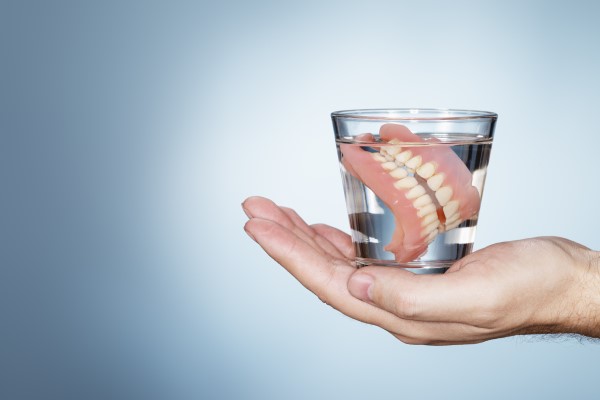Daily Tips for Wearing and Cleaning New Dentures

Dentures are oral appliances that allow you to get a beautiful smile and enjoy oral functions after losing one or more teeth. The adjustment process might be an issue for patients getting dentures for the first time, but with a little dedication and patience, dentures should soon feel normal in the mouth.
Wearing and cleaning dentures
When it comes to wearing dentures, there might be a learning curve where incorrect fitting, speech issues, bad smell, dry mouth, and even oral infections like stomatitis become issues that must be addressed. These potential adverse effects do not have to be reality; with appropriate care and maintenance, most denture wearers can eat, talk, and smile normally.
Maintain good oral health
The dentures may start harboring bacteria and oral fungal infections without proper oral cleaning. Patients need to clean their dentures regularly and make a habit of cleaning their gums, cheeks, tongue, and the rest of the mouth before inserting them. Bacterial accumulation in the mouth is how oral issues start.
Maintain a squeaky-clean set of dentures
Dentures, like natural teeth, may accumulate bacteria, form tartar, and become unsightly due to discoloration. Therefore, cleaning them every day is essential. Rinse the dentures first to remove any food debris and brush the dentures thoroughly using a toothbrush with soft bristles and a mild soap or denture cleaning solution.
Allow the dentures to soak in a specific cleaning solution overnight to make them bacteria-free. Brushing alone is insufficient. Food and germs may still be stuck where the bristles cannot reach. Soaking the dentures in the cleaning solution helps to eliminate food, germs, and plaque. After soaking the dentures, patients need to ensure they rinse them properly before wearing them.
Rest the mouth
When the dentures are not in the mouth, oral tissues regenerate quickly. Taking the dentures off will help relieve any sensitivity or pain that comes from wearing them. Every day, it is advisable to take out the dentures for at least 6 hours. Giving the gums a break while sleeping is usually the most convenient option.
Maintaining a good fit
Dentures are only comfortable if they are well-fitting. The fit comes from applying a denture adhesive to the gums. These adhesives do not only provide a secure fit, but they also keep food particles out of the tight spaces between the dentures and your gum tissue. Denture adhesives also allow wearers to eat and speak without worrying about the dentures slipping out of place.
Drink enough water to prevent dry mouth
A dry mouth makes denture wearers more prone to bacterial decay and can irritate the mouth and gums. Staying hydrated helps ensure optimal saliva production because dentures are known to increase the likelihood of dry mouth. Some medications can also cause dry mouth, so patients can talk to the dentist about recommendations.
The bottom line
Maintain a good cleaning regimen for your dentures and mouth to avoid issues with your oral health and the new prosthesis. For additional information or advice on how to live comfortably with dentures, contact our dental office.
Request an appointment here: https://www.carmelsmilesdentist.com or call Smiles in the Village Dentistry at (317) 218-7985 for an appointment in our Carmel office.
Check out what others are saying about our dental services on Yelp: Dentures and Partial Dentures in Carmel, IN.
Related Posts
Those missing one or more teeth with healthy natural teeth can benefit from partial dentures. Not only do partial dentures help people chew food correctly, but they also restore the appearance of a smile. Choosing partial dentures allows a patient to regain comfort and confidence without complicated procedures.Partial dentures are removable oral appliances that fill…
A tooth replacement procedure is vital if you are missing teeth. You will be happy to know that there are multiple options available to restore your smile. If you are missing a few or many teeth but have healthy natural teeth remaining, partial dentures make a lot of sense. This solution can improve your appearance…
When you begin wearing dentures, you may experience discomfort for a short period while you are adjusting. However, this process does not have to be complicated. There are many ways to make the adjustment more manageable and more enjoyable.Here are three reasons you can easily get through the first few weeks of wearing dentures.If you…
Partial dentures are a popular replacement option for missing teeth. You could potentially benefit from them if you have lost some of your permanent teeth, but there are still some healthy ones that remain in the jaw. Your dentist can explain if you are a candidate for partials. If you are, you should learn all…


